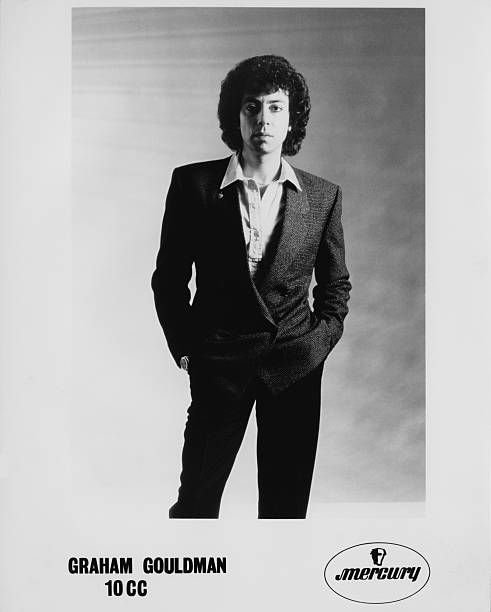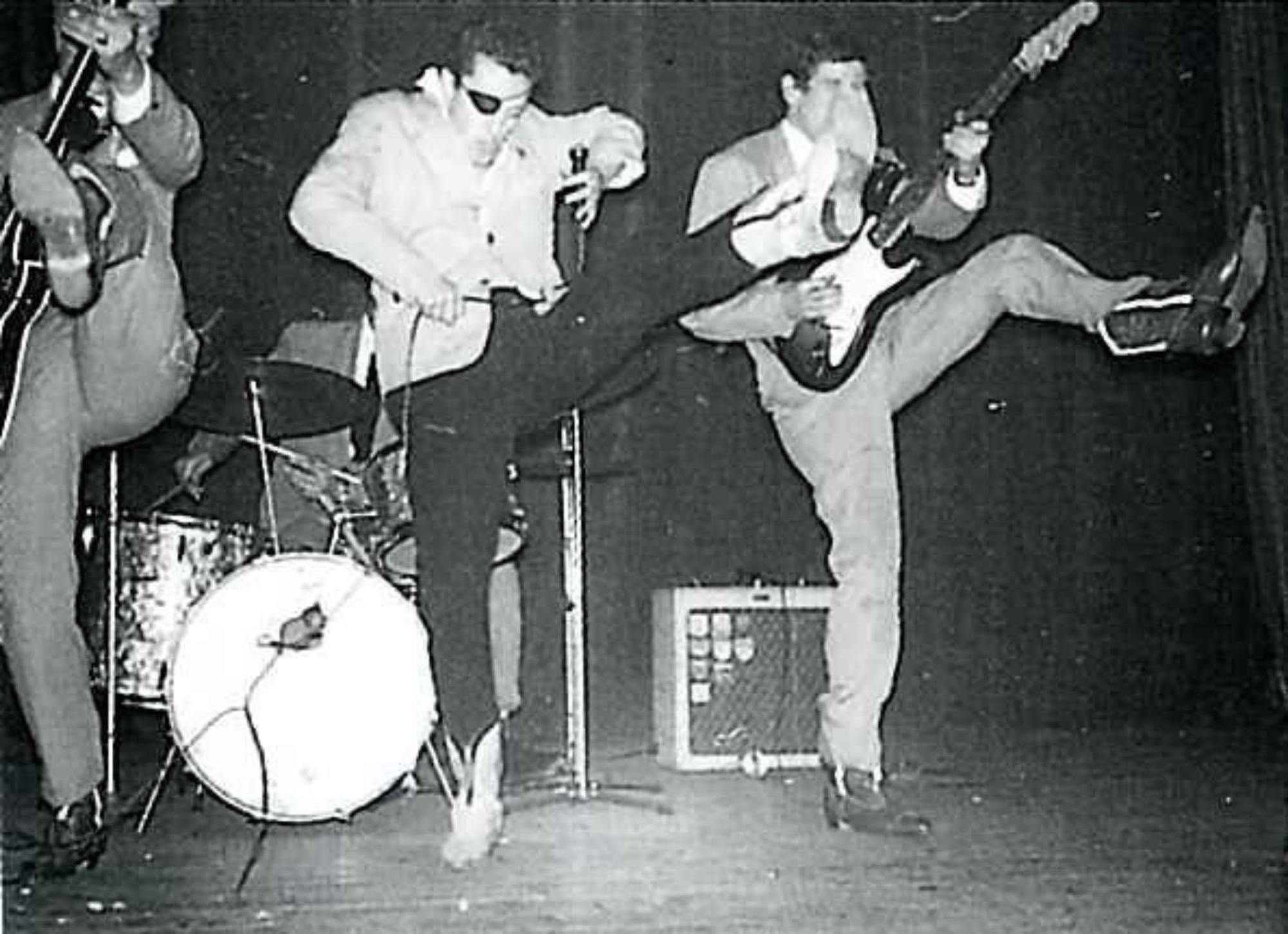
“My late father was a writer. He was great to have around. I would write something and always show him the lyric and he would fix it for me. You know, he’d say ‘There’s a better word than this’ – he was kind of like a walking thesaurus as well and quite often, sometimes, he came up with titles for songs as well.” Graham Gouldman.

Graham Gouldman was born in Broughton, Salford in 1946, and from the age of 16 had sang in a number of Manchester bands such as ‘High Spots’, ‘the Crevattes’, ‘the Planets’ and ‘the Whirlwinds’. Despite gaining a recording contract in 1964, the Whirlwinds failed to chart and Gouldman dissolved them the same year.
Next came ‘The Mockingbirds’ who started releasing material from Feb 1965. They released a few singles but were short-lived, releasing five songs over three labels with no hits. Kevin Godley played the drums. Their first offering was a Gouldman original entitled ‘For Your Love’ which he wrote aged 18 while working near Salford docks in a outfitters shop.
“I was sleeping most of the time because I’d been gigging with the Mockingbirds the night before, and then during the day when I’d got any spare time I’d write in the shop. I used to shut up the shop at lunch time and sit in the back writing.”
On The Beatles and their influence on songwriting – “well, I’m gonna really have a crack at songwriting. I had dabbled a bit, but they were really my inspiration and gave me and I think a lot of other people the courage to actually do it. We all wanted to be like the Beatles. I wrote two songs and the record company we were with turned down one of the songs.
The song that was turned down was ‘For Your Love’, and despite the rejection, Gouldman’s manager Harvey Lisberg was impressed with it. He tried to persuade Gouldman to give it to the Beatles. “I said, ‘I think they’re doing alright in the songwriting department, actually”, Gouldman recalled. But Lisberg, using a publisher managed to get a copy to the Hammersmith Odeon, London where the Beatles were playing a Christmas show.
Also on the bill were the Yardbirds, the song was played to them and in Feb 1965 they recorded it. Known for their blues rock roots, they wanted a more commercial pop rock sound, although guitarist Eric Clapton disapproved of the move and eventually left the band. The song reached number 3 in the charts, spending a total of 12 weeks on the chart.
Meanwhile, the Mockingbirds has started a regular slot as a warm up band for Top of the Pops which was filmed in Manchester. On one particular week the Yardbirds featured, playing ‘For Your Love’ –
Gouldman recalled: “There was one strange moment when the Yardbirds appeared on the show doing ‘For Your Love’, which was a song that I’d written. Everyone clamoured around them – and there I was just part of an anonymous group. I felt strange that night, hearing them play my song.”
Gouldman provided them with another demo ‘Heart Full of Stone’ which became the Yardbirds first song featuring Jeff Beck in place of Clapton. Music at the time was going through an experimental phase and this new song seemed to have it all, even suggesting a sitar in the arrangement (a demo of such was recorded) which was five months before the Beatles became the first band to use one in Western pop music for Norwegian Wood. Critic R.Unterberger described Gouldman as “a genius at effectively alternating tempos and major & minor modes”. The song reached number 2 and remained in the charts for 13 weeks.
Next up was the Hollies. Gouldman offered the Manchester band ‘Look Through Any Window’
Which he wrote while on a train –
“Yes, I was on a train coming back from London up from Manchester where I used to live, with a friend of mine, and he was looking out the window. He said, ‘Look through any window,’ because we were looking as the train crept out of the station and started going through the suburbs quite slowly. We were trying to look into the houses to see what was going on.” It gave the Hollies a number 4 single.
‘Evil Hearted You’ was the next hit, taken from the same album as ‘Heart Full of Stone’ and gave the Yardbirds and Gouldman another hit, this one reaching number 3 and staying on the chart for 10 weeks.
Critic R.Unterberger claimed the song as “one of the gloomiest hit singles in all of 1960s British rock” adding –
[It] throws in all of Gouldman’s mid-’60s bag of tricks: multiple abrupt tempo changes, a haunting Middle Eastern-influenced melody extremely heavy on the minor chords, a lyric abjectly pining for a woman’s love, and adroit integration of several contrasting sections.
‘Bus Stop’ was a song that gave The Holllies their first US top 10 hit.
Gouldman – “I began writing it whilst riding on the No. 95 bus which ran from East Didsbury – the route went through Manchester city centre, to Sedgeley Park, Cheetham Hill, Prestwich, and on to Whitefield near Bury. We were supporting the Hollies at Stoke Town Hall, they’d already done Look Through Any Window, and they asked me if I had any songs. So I borrowed Tony Hicks’ guitar and went into the toilet with him and Graham Nash – this doesn’t sound very good does it?! – I played it and they said it was great. They recorded the following week and it was out three weeks later.”
Either side of the release of Bus Stop came releases for Manchester band Herman Hermits. ‘Listen People’ was a ‘B’ side to ‘You Won’t Be Leaving’ which reached number 20 in March 1966, although released as the ‘A’ side in the US the previous month which peaked at number 3.
October 1966 saw his 2nd Herman Hermits single reach number 7 in the charts, this would be his last top 10 hit of the 60’s. ‘No Milk Today’ was written for the Hollies, lyrics inspired by Gouldman’s father.
Gouldman – “He’d been to visit a friend of his and noticed the milk bottle on the doorstep with the note, ‘no milk today’. He came back and said to me, ‘You should write a song called No Milk Today,’ and I said ‘What’s so interesting about milk?’, and he said, ‘It’s nothing to do with milk! There’s nobody in the house, the house is empty, the love has left the house.’ He helped me see it from a whole different point of view. Thanks, dad.”
Hermit’s lead singer Peter Noone – “Personally I think ‘No Milk Today’ is Herman’s Hermits’ best recording, and perfectly captures the moment and the feel of Manchester terraced houses and what was the end of a British era. I recall it was made at Lansdown Studios and that we recorded a few other songs that day, probably ‘There’s A Kind Of Hush,’ ‘Dandy’ and ‘No Milk Today.’ This was in the period where we (Mick and I) had just stopped using The Hermits on the recordings and were using the best musicians available to us to try to keep up with what had suddenly become The British Invasion. We were supposed to deliver 48 tracks a year to MGM so we were always scrambling to catch up.”

Stylusmagazine (June 2006), this “Is quite possibly the most compacted structure of any song from the period. Not that you might notice. The tune is so clever that it manages some perceptual tricks. If you are at all familiar with ‘No Milk Today,’ you may be surprised to learn that it is comprised of 16 sections.”
‘No Milk Today’ came from the album ‘There’s a Kind of Hush all over the World’ which also contained another Gouldman original released as a single – ‘East West’, about homesickness which was released in December 1966, peaking at 33.
Cher’s 1967’s album ‘With Love, Cher’ contained ‘Behind the Door’ and in the same year Jeff Beck (knowing Gouldman from his Yardbird days) released single ‘Tallyman’ about a debt collector keeping families in debt which reached number 30.
The last recording of the 60’s came in late 1969, Ohio Express ‘Sausalito (is the Place to Go)’. Ohio Express have been labelled more of a marketing brand (Super K) than an actual band, going through many changes, this track co-written and sung by Gouldman and performed by the four musicians who would later make up 10cc.
The Super K bubblegum pop had Gouldman admitting is was a career low point.
Working for the brand in New York –
“In the mornings I would go into the office and start writing and after I had finished one song in a day, which was very high output for me, they’d come up to me and say: ‘Give us another song!’ And I’d say ‘OK’ – because I’m like that. They’d keep up the pressure so that I kept on writing. I was there in their offices working like that for six or eight weeks and when I flew home to Manchester I went straight round to see my doctor. I was feeling sick and could not eat. The doctor told me: ‘You are totally over-worked.’ I don’t think I’ve ever felt so depressed as I did when I came back from New York.”
In the end, Gouldman persuaded Super K that himself and three friends, Kevin Godley, Lol Creme and Eric Stewart (From Mindbenders fame) could produce and perform all these songs themselves at a fraction of the cost.
Godley – “We did a lot of tracks in a very short time – it was really like a machine. Twenty tracks in about two weeks – a lot of crap really – really shit. We used to do the voices, everything – it saved ’em money. We even did the female backing vocals.”

In 1971 Gouldman, Godley, Creme and Stewart formed 10cc, a name dreamed up by their then-manager Jonathan King. In 1976 Godley and Creme left to continue as a duo and in-turn leaving Gouldman and Stewart as the 10cc duo.
The band had a string of hits, scoring three number 1 hit singles – Rubber Bullets (73), I’m Not in Love (75) and Dreadlock Holiday (78).
10cc officially split in 1983, Gouldman then teaming up with friend Andrew Gold to form Wax (84-90) who recorded four albums. Their most famous single ‘Bridge to your Heart’ which reached number 12 in 1987.

Other artists continued to enjoy the talents of Graham Gouldman including Amy Grant, Paul Carrack and Gary Barlow. He toured with Ringo Starr & His All Starr Band in 2018 and is currently on the road with a version of 10cc.

